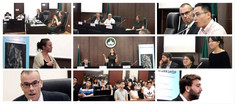“Welcome to a world full of oxymora!”, said Professor Rostam J. Neuwirth when he welcomed us to the international workshop on “Global Governance and Innovation: Law and Science Fiction” in Macau. Indeed, as soon as we had set foot on the territory of the Macao Special Administrative Region of the People's Republic of China, we realised that contradictions were all around us: Enormous casinos and modern hotels stand side by side with old and even decayed apartment buildings: The city is one of the richest poorest places in the world. Waiting for and then getting on the bus, we felt that it also might be the hottest (outside 30 degrees Celsius, 80% humidity) coldest place (inside air condition, freezing 18 degrees Celsius) in the world. These were only our first of many encounters with the contradictions and the diversity that characterise the city of Macau.
Until the end of the 20th century, Macau was under Portuguese administration, but in 1999 the People’s Republic of China resumed the exercise of sovereignty. Today, Macau has become the world’s largest gaming hub and a territory with the fourth highest GDP per capita as well as the highest density of population in the world.
Because of its particular history as a trading port, we find Macau at the nexus of Chinese and Portuguese Law. Moreover, there are influences from German law and even from the Common Law System, which is established in Hong Kong – only 50 kilometres away from Macau.
The recurring themes of diversity and contradiction were also reflected by the workshop topics: Although law and science fiction may seem like a contradictory pair, they provided the ideal framework to discuss various questions of global governance and innovation.
In his welcoming remarks, Professor Neuwirth pondered over the question why so many novel concepts in contemporary discourses are oxymora, like “alternative facts”, “artificial intelligence”, “cyborg”, “sustainable development”, or “glocalisation” etc., as he outlined in his recent book “Law in the Time of Oxymora”. This question also served as the starting point for the workshop, namely: How can we create a nexus between language, technology and the law and what does it mean in terms of the future of regulation and legal thinking? The Dean of the Faculty of Law, Professor Tong Io Cheng, formally opened the workshop and emphasised the importance of imagination for innovation as well as regulation. Subsequently, Professor Eisenberger held the workshop’s keynote address about “Machine Learning: A Narrative Device about Law”. Using different examples of deep learning applications, she argued that emerging technologies often challenge core legal concepts. However, contrary to the myth of lawlessness in the field of innovation, the law does not lag behind technology but rather establishes the framework for innovation in the first place. To help asking the right questions when discussing these challenges, science fiction can help by providing narratives and metaphors.
Following Professor Eisenberger’s keynote, the participants showed the variety of legal concepts that are being challenged by emerging technologies. One example is the concept of legal personhood, as Thomas Buocz argued in his presentation. Legal personhood for entities such as robots or natural objects can be an effective global governance tool. However, it does not substitute the discussion of any other regulatory problems such as liability issues. Other legal institutions that are being challenged by technology are the concept of legal death in the context of cryonics, discussed by Lynn Long or the concept of digital resistance, as Célia F. Matias explained. Even the role of money faces significant challenges in the light of new technologies such as fintech or blockchain, as Alexander Molotnikov illustrated. As outlined by Dai YIhan, Super-Artificial Intelligence is going to expand these challenges to numerous other areas of law and life. When it comes to regulation of outer space and cyberspace, challenges for the concept of territoriality arise, as was outlined in the highly interesting talks of the last workshop session: Zhijie Chen addressed the applicability of intellectual property laws in outer space, and Yaroslava Kuchina showed public and private law approaches to the regulation of problems related to cloud computing. In a fascinating talk about “Walled Gardens in Times of Deep Learning”, Danny Friedmann challenged the efficiency of safe harbour provisions in providing legal certainty and safety for online service providers (OSPs). Instead, he argued for a strict intermediary liability that, in his view, would incentivise proactive content filtering and, thus, increase legal certainty.
That the law is by no means powerless in the face of emerging technologies was illustrated by Sophia San Nicolò. In her presentation, she argued that human rights oblige the state to regulate the market entry of autonomous cars and to take account of the Black Box of AI. Furthermore, Alexandr Svetlicini showed that the concept of collusion in competition law is not only applicable to humans, but also to algorithms. Likewise, serious threats for human safety may also derive from the use of autonomous decision making in weapons and from killer robots, as Perumal M. Ramaswamy explained.
Spanning a broad scope of science fiction themes, the participants evoked characters such as the robot Chappy, the Bicentennial Man, the Knight Rider’s car K.I.T.T, or the super-computer Deep Thought from The Hitchhiker’s Guide to the Galaxy, to help them illustrate their points.
The lively discussions throughout the workshop revealed the importance to view governance challenges posed by innovation not only through the lens of technology, but also through the lens of the law. In this respect, the workshop concluded that the arising questions are complex and in urgent need to be subject to a public discourse and democratic decision-making involving society as a whole - for we have not yet developed a super-computer like Deep Thought that can provide us with answers as easy as: Forty-two.
Thomas Buocz and Sophia San Nicolò
Find the full report here.

